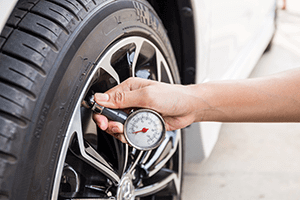
There are a number of things we have to do to keep our cars running like clockwork, from filling it up with petrol to getting its annual MOT done, it’s all part of a process. But one thing that is often overlooked is checking that your tyres are in good shape. Tyres are often forgotten about. However, they are the thing that carries the weight of your car and literally keeps it on the road. Are you guilty of neglecting your car tyres? At HiQ Tyres & Autocare Havant (Triangle Cars), we’ve come up with a checklist to help your check your car tyres are safe.
In Great Britain, you must have a tread depth minimum of 1.6mm. However, safety experts have recommended a minimum of 3mm. This is because cars take about two car lengths longer to stop when the tread on the car’s tyre is at least 3mm.
Tread Wear Indicators allow you to check your tyre’s tread depth, and it can be found along the main tyre groove. Their height is 1.6mm and they are small raised notches that allow you to check that your tyres match up with the law requirement of 1.6mm tread depth. You can also check your tread depth using a 20p coin. If you place the coin in the tyre groove and rest it between the tread blocks. You should then look to see if the rim around the coin has disappeared. If it has that means your tyres meet the legal requirement.
With car tyres, you have to make sure you have the right pressure in them because too much or too little can be damaging. If your car tyres are over inflated they will wear unevenly. This can mean your car will end up with longer stopping distances due to there not being enough rubber exposed to the road. On the other side of this, if your tyre is 20% under inflated it will lose ⅕ of its possible usage time. This can lead to overexposure of rubber on the road meaning that the car tyre gets broken down more quickly. You can find your car’s pressure in its owner’s manual or on the internet.
This is where your 20/20 vision comes in handy; every now and again you should look at the sides of your tyres and make sure there aren’t any gashes or lumps. If these are found they might be a sign of a structural defect. In bad scenarios, they can lead to premature failure of your car’s tyres and they are also caused by potholes. This kind of failure could be a type of blowout, in which the tyre doesn’t speed.
Dust caps (sometimes referred to as valve caps) are the tiny covers put on top of the valve stem on car tyres. They can be very annoying at times as they can be tricky to use, but are very beneficial when used correctly. They prevent water, grit and dirt from getting on the valve and causing damage. As well as that they also act as a secondary air pressure seal. If your tyres go without dust caps, it can result in your tyres losing pressure.
Believe it or not but the less you use your car the quicker the tyres will age. This is because if your car tyres aren’t being used they begin to harden and wear down. However, this can be prevented by using your car regularly. Tyres contain anti-oxidising chemicals which slow down their ageing process. However, process is only released when cars are in motion and driving. It’s advisable that you change your tyres every three years. Especially, if you’re a more regular driver and do between 10,000 and 12,000 miles per year in their car,
If you’re unsure about your car tyres before an MOT test or a long journey, these simple checks can help give you confidence when everything is okay. If you need new tyres, we’ll check them for you at HiQ Tyres & Autocare Havant (Triangle Cars). We stock in premium, mid-range and budget tyres for all makes and models. Contact us today if you’re not sure or book online for a visual inspection of your tyres.
